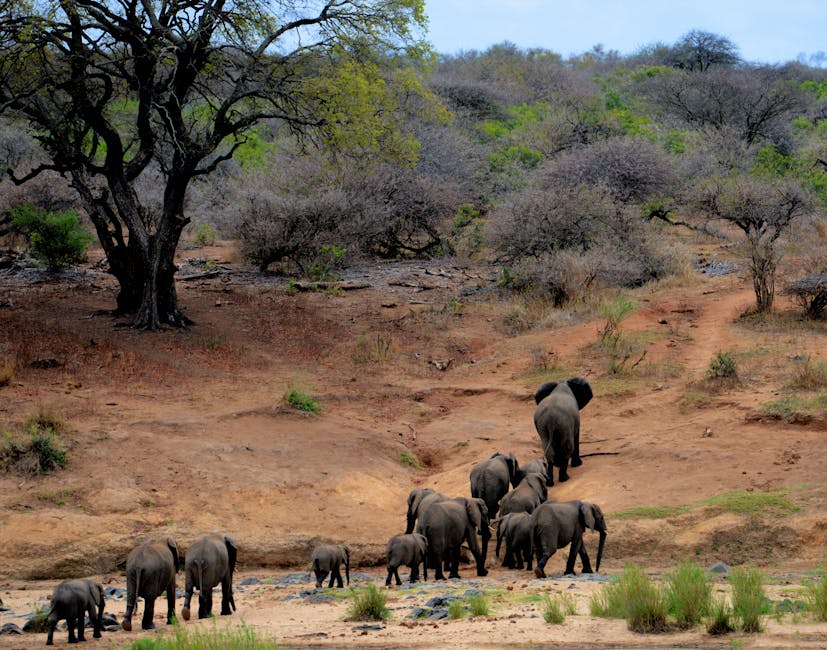A safari is an incredible journey into the heart of the wild, offering unparalleled opportunities to witness majestic animals in their natural habitats. Planning a safari, however, can seem daunting. This guide provides everything you need to know to create the perfect adventure.
Choosing Your Ideal Safari Destination
The first step in planning your dream safari is deciding where to go. Africa boasts numerous incredible destinations, each offering a unique experience. Consider your preferences regarding wildlife sightings, landscapes, and budget.
East Africa (Kenya, Tanzania, Uganda): Known for the Great Migration, vast savannahs, and abundant wildlife. Southern Africa (South Africa, Botswana, Namibia, Zambia, Zimbabwe): Offers diverse landscapes, including deserts, wetlands, and forests, as well as luxury safari options. Consider Specific Parks: The Serengeti, Maasai Mara, Kruger National Park, and Etosha National Park are all world-renowned.
Choosing the right destination often depends on the time of year you plan to travel. Some regions are better during the dry season for wildlife viewing, while others offer unique experiences during the rainy season. Research thoroughly to ensure your chosen location aligns with your desired wildlife encounters.
Types of Safari Experiences
Safaris are far from a one-size-fits-all experience. A variety of safari types cater to different interests and budgets.
Game Drives: The most common type of safari, involving guided tours in open-top vehicles. Walking Safaris: Offer an intimate connection with nature, allowing you to track animals on foot with experienced guides. Mobile Safaris: Involve moving between different campsites, providing a diverse experience of the landscape. Fly-In Safaris: Save time on transfers by flying between locations, allowing you to maximize your time in the bush. Luxury Safaris: Feature high-end accommodation, gourmet meals, and personalized service. Budget Safaris: Offer more affordable options, often involving camping and group tours.
Consider your comfort level, budget, and desired level of adventure when choosing your safari type. Walking safaris, for example, require a certain level of fitness, while luxury safaris cater to those seeking a more pampered experience.
Planning Your Budget for a Safari Trip
Safari costs can vary significantly depending on the destination, type of safari, accommodation, and time of year. It’s crucial to create a realistic budget to avoid any surprises.
Accommodation: Prices range from budget-friendly campsites to luxurious lodges. Transportation: Consider the cost of flights, transfers, and game drive vehicles. Park Fees: National park entrance fees can be a significant expense. Activities: Factor in the cost of game drives, walking safaris, and other activities. Food and Drinks: Budget for meals and beverages, especially if they are not included in your package. Tips: Tipping guides and staff is customary. Travel Insurance: Essential for covering unforeseen medical expenses or travel disruptions.
Research average costs for your chosen destination and activities. Consider booking your safari during the shoulder season (between peak and off-peak seasons) for better deals.
What to Pack for Your Safari
Packing appropriately is essential for a comfortable and enjoyable safari experience.
Clothing: Lightweight, breathable clothing in neutral colors (khaki, olive green, brown) Long-sleeved shirts and pants to protect against insects and the sun A wide-brimmed hat Comfortable walking shoes or boots A warm jacket or fleece for cool evenings Swimsuit (if your accommodation has a pool) Essentials: Sunscreen with high SPF Insect repellent Binoculars Camera with a zoom lens Headlamp or flashlight Personal toiletries and medications First-aid kit Copies of important documents (passport, visa, travel insurance)
Avoid packing bright colors, as they can attract insects and disturb wildlife. Pack light to avoid excess baggage fees and make it easier to move around.
Ensuring a Responsible and Ethical Safari
It’s crucial to choose a safari operator that prioritizes responsible tourism and conservation. Support companies that:
Employ local guides and staff: This benefits the local community and provides authentic cultural experiences. Contribute to conservation efforts: Look for operators that donate a portion of their profits to wildlife conservation programs. Minimize their environmental impact: Choose eco-friendly lodges and practices that reduce waste and pollution. Respect wildlife: Ensure that game drives are conducted responsibly, maintaining a safe distance from animals and avoiding disturbance.
By choosing a responsible safari operator, you can contribute to the long-term sustainability of wildlife and ecosystems.
Health and Safety Considerations for Your Safari
Your health and safety should be top priorities when planning a safari.
Vaccinations: Consult your doctor about recommended vaccinations for your chosen destination. Malaria Prevention: Take appropriate malaria prophylaxis medication as prescribed by your doctor. Sun Protection: Wear sunscreen, a hat, and sunglasses to protect yourself from the sun. Insect Protection: Use insect repellent and wear long-sleeved clothing to prevent insect bites. Food and Water Safety: Drink bottled water or water that has been properly treated. Eat at reputable establishments. Wildlife Safety: Follow your guide’s instructions and maintain a safe distance from animals. Travel Insurance: Ensure you have comprehensive travel insurance that covers medical expenses, evacuation, and trip cancellations.
Be aware of your surroundings and take necessary precautions to minimize risks. Inform your safari operator of any pre-existing medical conditions.
The Best Time to Go on Safari
The best time to embark on a safari largely depends on the specific region and your desired wildlife sightings. Generally, the dry season (June to October in East Africa, May to September in Southern Africa) is considered the best time for wildlife viewing, as animals congregate around water sources.
Understanding Safari Animals and Wildlife
Knowing which animals you might encounter enhances your safari experience. The “Big Five” – lion, leopard, elephant, rhino, and buffalo – are often high on the list, but there’s so much more to see.
Predators: Lions, leopards, cheetahs, hyenas, wild dogs. Herbivores: Elephants, giraffes, zebras, wildebeest, antelopes, buffaloes. Birds: A vast array of species, from colorful bee-eaters to majestic eagles. Reptiles: Crocodiles, snakes, lizards.
Learning about animal behavior and tracking skills can greatly enrich your safari. Many guides are experts in identifying animal tracks and signs, providing valuable insights into the wildlife around you.
Booking Your Safari Adventure
Once you’ve chosen your destination, safari type, and budget, it’s time to book your adventure.
Research Safari Operators: Read reviews and compare prices from different operators. Check Inclusions and Exclusions: Understand what’s included in the price, such as accommodation, meals, activities, and park fees. Book in Advance: Especially during peak season, it’s essential to book well in advance to secure your preferred dates and accommodation.
- Read the Fine Print: Carefully review the terms and conditions of your booking, including cancellation policies.
Consider using a reputable travel agent specializing in safaris. They can offer expert advice and handle all the logistics for you.
The Magic of a Safari and Wildlife Encounters
A safari is more than just a vacation; it’s a transformative experience that connects you with nature and the wonders of the animal kingdom. Witnessing the raw beauty of the African wilderness and the incredible diversity of wildlife is truly unforgettable. From the thrill of tracking lions to the serenity of watching elephants graze, a safari offers moments that will stay with you forever. This trip will give you memories that last a lifetime.
Conclusion: Your Safari Awaits
Planning a safari requires careful consideration and preparation, but the rewards are immeasurable. By following this guide, you can create an unforgettable adventure that aligns with your interests, budget, and values. Start planning your dream safari today and prepare to be amazed by the beauty and magic of the African wilderness. Don’t just dream about it, book it!
Related Articles
- How to Fax From iPhone: A Comprehensive Guide
- Best iPhone to Buy Right Now: Your Ultimate Guide
- How to Reset Your Android Phone: A Comprehensive Guide






